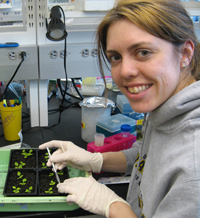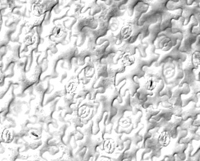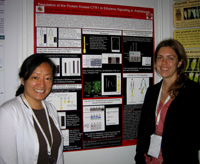
Meet Our Graduate Students
Interesting Fact: She could drive a tractor by the age of 6 and had a pet calf named Red. Mandy Kendrick, who grew up on a farm, had always thought plants were boring and had planned on pursuing veterinary medicine. All this changed when one day her biology teacher in college mentioned how plants turn yellow when they are deprived of nitrogen. This interesting bit of information got Mandy thinking about plants’ molecular mechanisms and the need to react rapidly to changes in environment. Pursuing Her Newfound Passion For Plants By testing for protein-protein interactions in yeast, Chang’s lab previously identified many Arabidopsis proteins that could be involved in ethylene signaling based on each protein’s ability to directly interact with the Arabidopsis ethylene receptor protein ETR1. One of these proteins EIP1 (ETR1-Interacting Protein1) is of special interest because it can also associate with additional proteins known to be involved in ethylene signaling. Figuring out the Role a Protein Plays in a Cell In order to confirm this phenotype, Mandy will attempt to reduce the expression of EIP1 in wild-type plants, using a new technology available to Arabidopsis researchers, called amiRNA (artificial microRNA’s) which target specific RNA’s (in my case the EIP1 mRNA) for degradation. If reducing EIP1 expression results in the same smaller, more compact phenotype as the previously mentioned eip1 mutant, then her proposed hypothesis that EIP1 is involved in cell elongation is strengthened. In addition, Mandy has analyzed plants that over-express EIP1. Why UMD was the Perfect Fit, and Future Steps Mandy wanted to attend UMD because she felt like it had a strong core of people and was made up by a very interesting community. In addition she appreciated the genuine and helpful interactions she had with the graduate director. The geographic location, nice diversity and topnotch lab tools provided added bonuses. Mandy will be graduating from UMD in December 2008 and is looking forward to either pursuing a post-doc position, possibly in plant pathology, or perhaps going into science education. Visit Dr. Chang's Lab website for more information on Mandy's research. Visit the Department of Cell Biology and Molecular Genetics website.
|
[an error occurred while processing this directive]
![]()
| Prospective Graduate Students |
College of Chemical & Life Sciences * University of Maryland * College Park, MD 20742
 Mandy Kendrick
Mandy Kendrick
